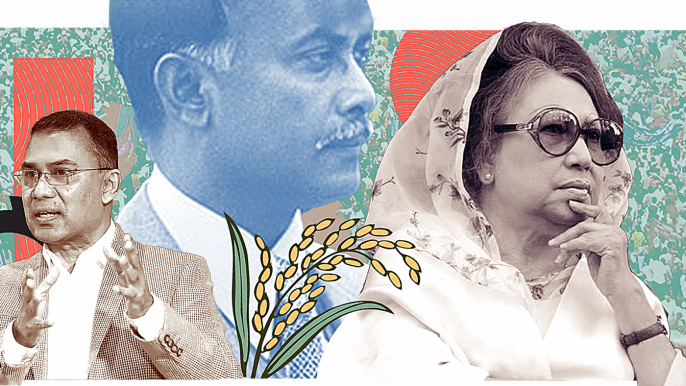Online Report
As BNP celebrates its 47th anniversary, the party—after years of subjugation and persecution by the ousted fascist regime—finally finds itself poised for power. But can it rise above internal discord and public doubt to lead a nation hungry for stability, reform, and democratic renewal?
Illustration: TBS
Illustration: TBS
In the year since the fall of Sheikh Hasina’s government, the Bangladesh Nationalist Party (BNP) has occupied a rare and precarious position. For the first time in 15 years, it stands not as an embattled opposition suffocating under authoritarian rule, but as the dominant political force in a country preparing for its most consequential election in decades.
The February 2026 polls, if held as scheduled, are widely expected to deliver an easy BNP victory. In an electorate where nearly half remain undecided, the party’s challenge is less about survival than about proving it can govern responsibly—a test that has already begun. As the party celebrates its 47th anniversary today (1 September) amidst much fanfare, it also stands at the crossroads of past and future—and the road it opts to pursue.
The months since 5 August 2024 have been defined by two conflicting narratives. On one side, BNP high command portray themselves as disciplined stewards of stability and reform. On the other hand, critics point to violent factionalism, delayed consensus on reforms, and widespread extortion and clashes among the grassroots members. Both narratives are true in part, and both will shape the next election.
Restraint in the days of uncertainty
The Business Standard Google News Keep updated, follow The Business Standard’s Google news channel
The chaotic three days following Sheikh Hasina’s resignation presented the most immediate test of BNP’s political maturity. After 5 August, the country had no government for 3 days. Many expected widespread violence or a cycle of vendetta against the Awami League supporters. The country teetered on the brink of lawlessness, fearing wholesale violence.
During that time, Begum Khaleda Zia, the chairperson of BNP, urged the people of the country not to engage in vendetta and destruction. On 7 August, at the rally of the party, the Acting Chairman of BNP, Tarique Rahman, also reiterated the point, pressing on maintaining law and order and making the country stable.
While talking to The Business Standard, standing committee member Salahuddin Ahmed recalled that time. “When Sheikh Hasina was forced to flee and the fascist regime came crashing down, the situation in Bangladesh was tumultuous. At that moment, the acting chairman of the Bangladesh Nationalist Party (BNP), Tarique Rahman, strictly instructed the party members not to engage in any sort of violence, vendetta or retaliatory activities,” Salahuddin said.
“He urged them to have patience, take necessary steps to uphold law and order, and join the people to stabilise the country. And it worked like magic; the people greatly appreciated the gesture.”
The decision, he argued, prevented the feared spiral into revenge killings and score-settling. “There have been a few isolated incidents, but that is mostly due to the absence of law enforcement agencies, and we tried our best to prevent such incidents.”
BNP’s conviction to promote new politics
Tarique Rahman has repeatedly shown his commitment to the new politics—a fresh break from the traditional politics in Bangladesh. He said, “People are demanding a change in traditional politics. The days of slogan-based politics are over.”
And it has been evident since last August. BNP has promoted its 31-point reform agenda all over the country—both to the public and to its members. BNP has organised hundreds of programmes across the country to promote its 31-points.
Mahdi Amin, Adviser of BNP’s Acting Chairman Tarique Rahman, said, “Over the past year, we have organised seminars and programmes across the nation—from divisions to districts, from districts to upazilas, and from upazilas to the grassroots. We have taken our policies directly to the people, beginning with our 31-point agenda. We reached out to stakeholders from every profession and social class, listened to their ideas, and refined our proposals accordingly. These engagements are reflected in the recent speeches of our acting chairman.”
BNP is the only party with a concrete vision for every sector of the country, he claimed, and they are ready to implement that vision from day one.
“We take a lot of pride in being the only party to do a series of internal consultations and hold external dialogues with stakeholders. A good policy is just not a top-down programme, it involves an interactive engagement with the grassroots.”
“For the past year, our central mission has been to restore the voting rights of the people of Bangladesh. Since 2014, 2018, and 2024, no government based on a genuine popular mandate has come to power. We believe that in the upcoming February 2026 election, the people’s foremost aspiration will be to elect a government that enacts policies to improve the quality of life for all.”
The reality of infighting and extortion
Yet, the attempt to introduce new politics is being hampered by the grassroot-level leaders and members today, with widespread allegations against the BNP members engaging in extortion, clashes and other crimes. This has enabled the critics to perpetuate the slogan that BNP and Awami League are venoms that come from the same snake.
Since August last year, at least 43 BNP leaders and activists—including members of its affiliates Jatiyatabadi Chhatra Dal (JCD) and Jubo Dal—have been killed in internal clashes, according to Ain o Salish Kendra. Over 2,000 have been injured in some 200 incidents across 50 districts.
Commentators fear that before election, there may be severe infighting among aspiring candidates for nomination; even though the most common are the cases of corruption and extortion.
Mirza Fakhrul Islam Alamgir, BNP’s secretary general, reiterated the party’s commitment to justice. “The culture that has grown in the 15 years of Awami fascism cannot be uprooted so easily,” he said. “If the people entrust us with their votes and elect us as the next government, we will do whatever is necessary to ensure these evils are uprooted.”
When Sheikh Hasina was forced to flee and the fascist regime came crashing down, the situation in Bangladesh was tumultuous. At that moment, the acting chairman of the Bangladesh Nationalist Party (BNP), Tarique Rahman, strictly instructed the party members not to engage in any sort of violence, vendetta or retaliatory activities. And it worked like magic; the people greatly appreciated the gesture.
SALAHUDDIN AHMED, STANDING COMMITTEE MEMBER OF BNP
For Salahuddin Ahmed, the numbers demand scepticism. “We are not in control of the law enforcement agencies; we are not in the government. We are neither sheltering nor denying any of the offenders; rather we are co-operating with the government and law enforcement agencies, and in some cases, handing our own members to the authorities if they were accused.”
According to media reports, till July, BNP has taken organisational action against approximately 3,200 leaders and activists of the party and its affiliated bodies. Among them, 1,800 are BNP members. Of these, 800 have been expelled, 50 have had their positions suspended, at least 700 have been served show-cause notices, 100 have been cautioned, and 150 have received notices for breaching party discipline.
The Chhatra Dal has so far expelled 400 members and issued show-cause notices to 600 leaders and activists. The Swechchhasebak Dal has expelled at least 100 members and issued show-cause notices to 150, while the Jubo Dal has also expelled over 100 leaders and activists.
Salahuddin Ahmed added, “The government and the authorities should take a stricter stance against such miscreants. BNP can not enforce the law; that needs to be done by the government.”
Mahdi Amin, adviser to BNP’s acting chairperson Tarique Rahman, takes a broader view. “BNP is such a big party that there have been fake cases against six million party members of BNP under Awami rule. Among so many people, there are a few who went against the party discipline and engaged in unlawful activities. However, the fact remains that despite the culture of impunity in the last 16 years, BNP remains the only party to investigate the accusations and take disciplinary actions against the accused if evidence is found.”
Similar narratives, he said, have been constructed around other local crimes. “The concerted effort to malign BNP by connecting everything to extortion or creating a narrative to involve BNP in any sort of crime has been going on for a while.”
The test ahead
BNP’s trajectory over the past year offers both reassurance and warning. It has demonstrated the capacity to project stability in moments of national crisis, articulated a coherent (if selectively applied) reform agenda, and engaged meaningfully with the country’s youth and undecided voters. Yet the persistence of factional violence, even amid mass expulsions and public directives, exposes the limits of central control in a party of millions.
“Of course, there are a lot of expectations,” Mahdi Amin said, “and BNP is committed to working with the pro-democracy stakeholders of the country to build it together as per the democratic aspirations of the people. We want to make the most powerful person of the country—the Prime Minister, accountable to the most marginalised person of the country—be it a rickshaw puller, a worker or a farmer.”
Another critical issue is the divergence from Jaamat-e-Islami, BNP’s old ally, and now the relationship has turned into a bitter rivalry. And owing to the ongoing differences with the National Citizen’s Party (NCP), the days ahead may be marred by political differences regarding the reform proposal, PR system and the July Charter.
Now, a common question these days has been—when will Tarique Rahman return?
Mahdi Amin said, “Being the leader of the party who has sacrificed the most during the last 16 years, the party with the highest number of victims of enforced disappearances, of course Tarique Rahman wants to return to the country and ensure justice is delivered not to our party members but to every pro-democratic individual who suffered. We need to improve the law and order situation. Every single person who was wronged during the authoritarian Awami League regime must get respite and get fair treatment, which remains pending.”
“Once we do it, then we can claim that the law and order situation has improved, and Tarique Rahman will come back to serve the people.”
In the months ahead, BNP will need to convince voters—and the world—that it can translate electoral dominance into disciplined, reform-orientated governance. Even if BNP wins the next election, it must ensure that the “magic” of its early restraint after August 2024 becomes the norm, not the exception.


